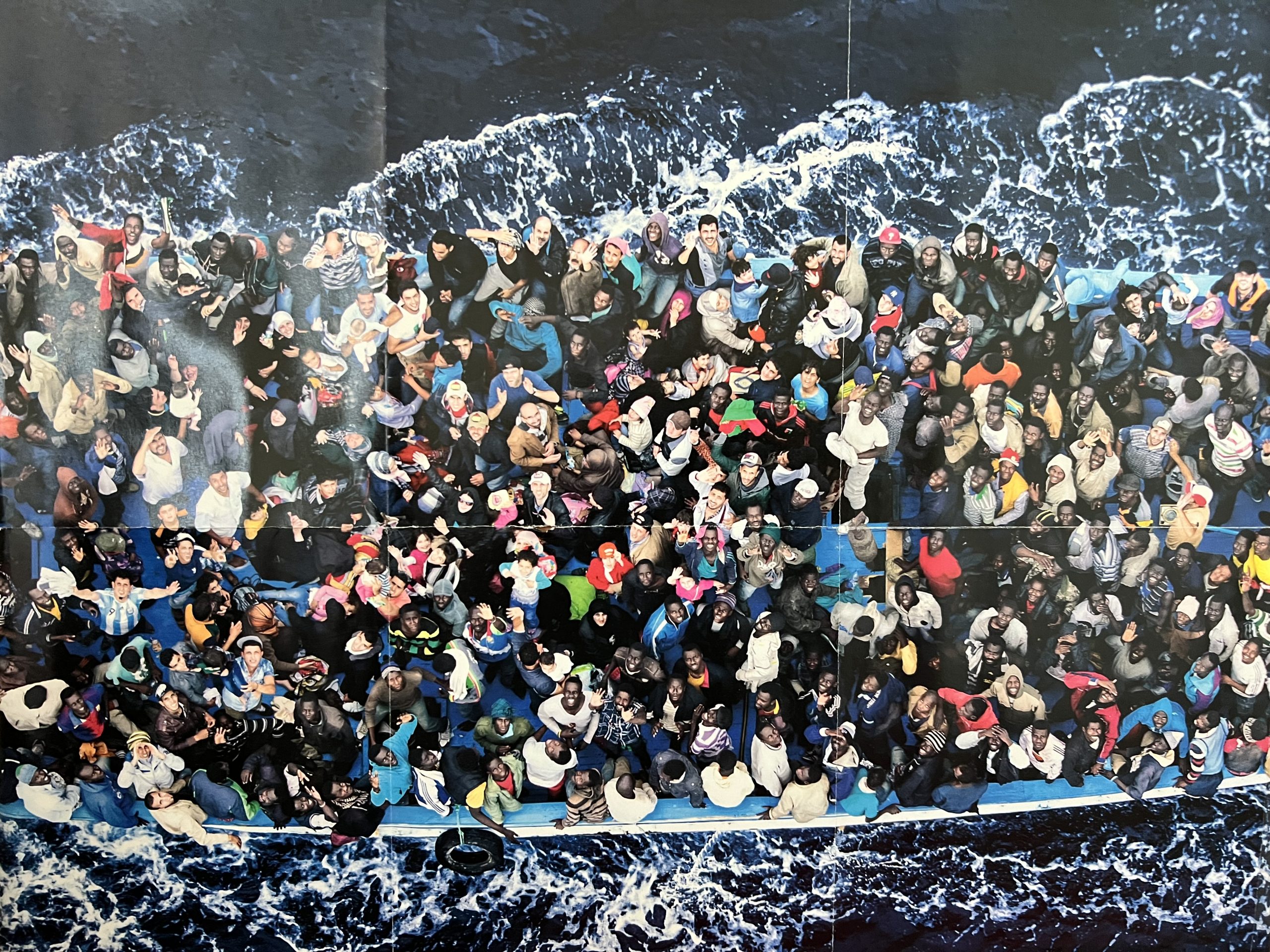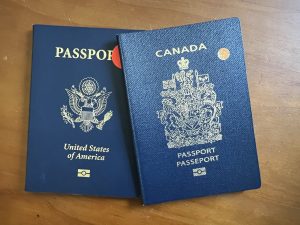
It must have been an old movie. in black and white, a man in a fedora and long coat, a woman also bundled up and nervous, are standing in front of a uniformed man with a guttural accent. He peers at their (falsified) documents, looks deep into their faces, asks some sharp questions. Time is drawn out, there is suspenseful music, my heart is tight. Their lives depend on this moment. At last there is a curt nod and they hurry across the border, into the mountains, to freedom. In the 1950’s, escape from the Nazis was not ancient history.
I still have a pang in my gut crossing any border, even when it should be benign. Anything could happen in that liminal area.
That scrutiny at the border, the vulnerability, the capriciousness of fate and luck made a deep impression. I still have a pang in my gut crossing any border, even when it should be benign. Anything could happen in that liminal area.
I remember the stories of people killed trying to escape over the Berlin wall. In 1964 I was on a school trip to the Soviet Union and Poland; the train was stopped in the middle of the night crossing from Czechoslovakia into Austria while green-uniformed men with guns brusquely inspected every compartment, shining lights above and under the cars, looking for stowaways. I have had to walk across borders several times—Peru to Bolivia, Morocco to Spain—suspended in no-man’s land while going through slow and uncertain bureaucratic processing. I felt like a criminal as my bags and papers were inspected going to and coming from a Cuba trip. South Africa almost sent me home because I didn’t have enough visa space, and I was denied passage from Germany to the US because my passport was expired (trip to consulate in both cases). Still, as an American, white, woman, professionally educated, employed—the truth is I have personally been able to travel widely without life-threatening border consequences. And yet.
There is a very, very, very long history of refugees seeking safety from war, poverty, persecution, climate—people from all backgrounds, from Europe to Asia to Africa and the Americas. The risk of staying must be worse than the often deadly risk of crossing borders. The stories are heartbreaking.
After the September 11 2001 attacks on the US, the vengeful “war on terror” had some terrible missteps and repercussions. The “Patriot Act” resulted in restrictive no-fly policies, searches and demands for documents unprecedented for movement within the US, and even more so for anyone trying to get into the country. The airports were festooned with oppressively enormous flags with an unfortunate resonance with the German swastikas which draped stadiums in “Triumph of the Will”. As identification papers data has become digitalized, old infractions, debts, or simple computer error may show up when trying to travel and derail plans. A relative working in a US visa line once used my passport to demonstrate how they run the information through the computer, and it was chilling. The fact is that you don’t have to be guilty of anything other than being a designated “other” in a current political order to be at risk. As such measures have become entrenched worldwide, microchips make fooling the border guard with altered papers, as in the last century, a dream.
My border fears often flared up when I immigrated to Canada, which I did after they changed laws to allow same-sex marriages (years before it was legal in the US) and our subsequent elopement to Niagara Falls. Today, with both US and Canadian citizenship, crossing the border is pretty easy, but it doesn’t mean that knot of worry is gone. I still hate crossing any border. The future political landscape is fraught with the threat of autocrats and war just about everywhere, not to mention the future of the planet from climate change. There is only relative refuge.
However, I will admit that when I officially “entered” Canada in 2004, after the agonizingly lengthy process at the border of presenting my work permit and list of possessions and documents, the movie that ran through my head was the one from that distant memory—the two people escaping over the border and into the mountains beyond with hope and relief.




All things considered you have handled it all very well.
So far, so good. Miles to go.
Thanx Khati for your ever thoughtful, and beautifully told .though painful stoty.
I’m reminded of movie scenes as you describe, other stories of human despair, and family of my own who fled homelands in fear, two with just the clothes on their backs.
And despite the divisiveness and injustices within our own borders, I remember returning from abroad with the urge to kiss the ground at Kennedy airport.
https://www.myretrospect.com/stories/the-lady-with-the-torch/
Yes, “you don’t know what you’ve got ‘til it’s gone!” I had the same feeling of gratitude when we arrived in Austria after coming through the Czech border. Can’t give up, too important.
It’s strange how images will trigger or reawaken fears. You are a traveler, and the stakes are high. You described with such clarity how frightening it is to be in the middle of nowhere with no one to speak for you, suspicious people with political histories and realities behind them. You did a great job of describing that feeling. Fears, indeed, Khati.
The discretion of the functionaries at the border is absolute, so you have to submit and hope for the best.
Khati. your detailed description of places and feelings inspired me to remember my own–but not as eloquently. I have had many run inns: an order to leave Italy in 24 hours, a security detention in China and Japan–complete with a signed confession–bribes through customs (Japan and Soviet Union) and the fear of secretly carrying forbidden materials into China and Taiwan.. I wish I had your narrative ability. I can only catalogue.
As usual, your adventures are far more daring than mine—there are some dramatic stories there! I did have a scare when my work permit expired and was not renewed because they didn’t have a medical exam on file—so was told I had to leave clinic on the middle of the day and leave the country in a few days! Of course they HAD the medical exam but it took calling on the local politician to sort it out. Fortunately I was back on track in a week but it was one of those pit of the stomach heart drops in the meantime.
Khati,
I love the photo and your piece. You truly bring the reader into feeling the angst at border crossings, which make one- or me actually- think about the rationality of ‘border’ crossings. The borders can be arbitrary; they can change over time. And we’re all human beings so you can almost view borders as cages for populations. I envy your experiences in ’64- how lucky you’ve been- in spite of the angst. Like you, I’m an inveterate traveler-somewhat intrepid. Lucky you, that you got the new American dream 20 years ago, when you moved north.
I’m sure you have had that experience as a traveler of the precarious nature of border-crossing too—borders may be arbitrary and so can be those who guard them. You may remember traveling in Europe before the EU accords, and the miraculous freedom after that. Sorting out our divisions with the planet at stake is the existential challenge of now.
Your fear is not irrational. Crossing borders can be a harrowing experience for many, especially those seeking asylum.
Exactly. I think about that a lot and feel incredibly privileged in comparison.